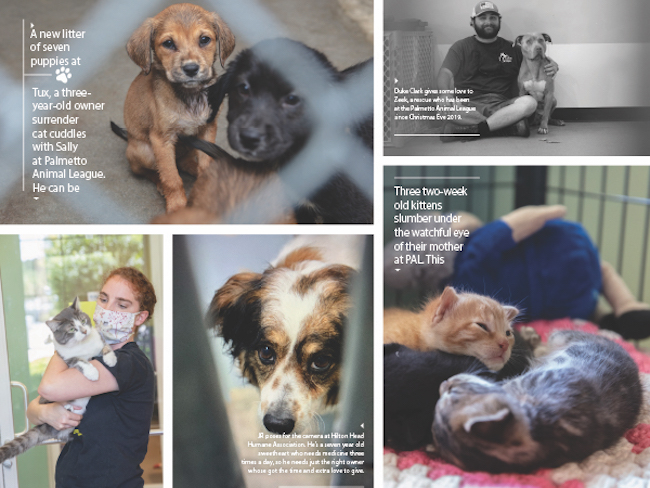Rolling into May 2020 like we all just fell out of the back of a pickup, there are mixed feelings about what we’ve been through and how to approach the “staged re-entry.” Wondering about the new normal, we’re behaving a bit munchkin-esque, emerging on tip-toe to assess the damage and see if we’re in the clear or if other wicked witches might be popping in to ask, “Who killed my sister?” During this storm, there were some faithful community staples who never stopped taking care of Toto.
Two prominent forces of good and animal welfare, the Palmetto Animal League and Hilton Head Humane Association, shared their experiences, their hustle, and what they’re expecting next (and need from us) as the sun begins to shine on re-opened beaches and dog parks.
The Hilton Head Humane Association, under the leadership of executive director Franny Gerthoffer, operates a shelter location on the island, and recently added the “New Animal Campus” in Okatie. Incorporated in 1976, HHHA has this year alone helped 3,000 abandoned, injured, abused animals.
Neighboring Palmetto Animal League, headed by Amy Campanini is, this year, “celebrating 10 years of saving lives.” Also rescuing in the thousands through the years, PAL’s adoption center in Okatie’s Riverwalk Business Park right now serves as a temporary residence for nearly 200 dogs and cats in search of a “furever” home.
You know all the memes and tributes to those who can’t stay home? Less obvious participants in that intrepid category are those responsible for the shelter, rescue, and adoption of our (most often) four-legged friends. Pups still need walks and cats still need head scratches, and that’s the edited version of saying they need emergency surgeries, food supply increases (as local families face unparalleled financial setbacks as part of COVID-19’s domino-impact on the economy), and additional staff and admin support as emergency populations grow.
The definition of grit in crisis, Gerthoffer simplified the hurdles. “Growing up playing basketball, I had a coach who used to say, ‘don’t be afraid of the ball,’ and that’s how we’re approaching this challenge,” she said.
“We’re not running away from it or waiting to see what others are doing. We have families who need help, animals who need regular care—that doesn’t change—and veterinary care. We just watch for where the ball is showing up, go to where the need is.”
This perspective explains why HHHA’s longstanding community presence is built on great relationships.
Gerthoffer extolled the graciousness of local business owners who showed up with creative support, delivering hard-to-find paper goods, and one individual proprietor going out of their way to amass an impressive collection of cat carriers when there was a spike in need. With a dedication that can’t be deterred, she said, “I don’t know why we get blessed by such selfless people, but we do—and they are.” “Crazy fabulous,” she calls it, repeating the words, incredulous that so many go so far out of their way, often without even being asked.
“We’ve used this time to find better ways to work with others. It hasn’t been time off; it’s been time digging in, figuring out how we can hold on to what works and build it better, with even safer and more succinct protocols.”
This work not only never stopped, it leveled up and is predicted to increase again as we phase back in. Addressing the issue of overflow Campanini said, “To make room for rescuing the most at-risk animals during the crisis, we quickly expanded our foster program, and many volunteers signed up to help us in this area. Unfortunately, when this is over and area shelters reopen, we anticipate there will be a surge of surrendered and abandoned animals.”
One step in fighting this capacity overload is PAL’s Pet Food Bank. “When we arrived last week to deliver pet food to four local pantries, pet owners were already in the parking lot, waiting for us to arrive, Campanini said. “As the financial burden continues, PAL is working to increase the number of deliveries we make and provide pet food at more locations. With many people suffering and worrying about how to feed their families, having pet food available at local pantries may be the factor that keeps an animal in his home.”
PAL’s Pet Food Bank Project is accepting donations in the bins out front for distribution to those who need them: bags of cat, dog, puppy and kitten dry food, canned dog and cat food, broken or open bags of dog and cat food (will be examined for freshness and repackaged), and one-gallon Ziplock bags and paper shopping bags.
Another increase was in the area of adoptions, as many are seeking companionship and connection under current conditions and have greater ability to invest time and attention in getting a new “loved one” adopted and adapted. Both organizations have remained continuously available throughout the shutdown, encouraging, “Don’t self-isolate—adopt!” and “Adoption is the Best Option” via one-at-a-time adoption appointments, open-air adoptions, even a fully virtual adoption experience at PAL, from the video meet and greet with a cat or dog, to completing your adoption application via phone, and pet pickups in the parking lot.
Though located in the Hilton Head Island/Bluffton area(s), the impact of these organizations reaches beyond the Lowcountry by a country mile. “Thanks to steadfast support from donors, no place is too far to travel for a rescue mission. We operate an active rescue network (including a transport program) that extends across state lines, rescuing from dire situations and delivering into the arms of adopters hundreds of miles away,” Campanini explained. “Homeless pets are given a lifetime (no-kill) commitment. We care for them until they find a home. There is no limit to their stay at PAL.”
As of this writing, the all-clear date is unclear for resuming on-site volunteering or reopening organization-owned thrift stores: HHHA’s The Litter Box, “Goods for People, Great for Animals,” and the PAL Thrift Store in Sheridan Park, “Where Great Buys Save Lives.” (Clearly the marketing game is strong among the animal lovers.) Even more felt is the temporary postponement of planned annual fundraisers. So, in light of the loss and the noticeable need, how can we help? At the heart of organizations like these is the basic premise for any animal lover, philanthropist, or servant-hearted volunteer, and now more than ever, they need us to respond:
1. Adopt and foster
2. Care for your pet affordably (in-house veterinary services)
3. Support and serve (volunteer, donate, and shop associated thrift stores when they open).
For all quarantine 2020 tried to steal, it was (and is) also a time to realize the amount of help available around you, including for your pets, and to learn how we can do better: Give, love, serve, save, and bring new “family” home.
For more information:
PalmettoAnimalLeague.org | (843) 645-1725
HHHumane.org | HHI: (843) 681-8686, Okatie: (843) 645-8400



